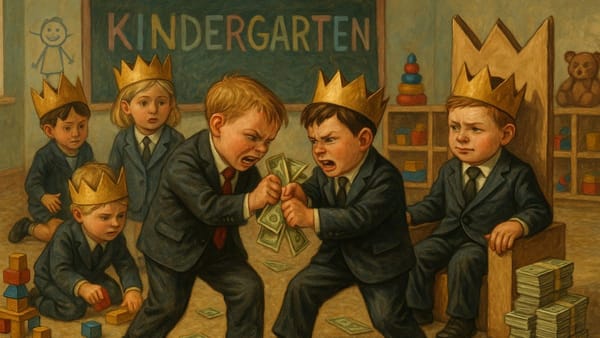I recently reignited my love for economic science, which was my passion for a few years around my early 20s and even led to my studying the subject in college. My academic journey didn't last long for many unrelated reasons. Still, my love for abstractions, such as money and its flows, remained despite my even greater love for philosophy and spirituality.
However, after years of listening almost exclusively to philosophical and spiritual lectures, it's fascinating and terrifying to rediscover economics and money content on the Internet. It's crazy how popular most of this stuff is — and how silly it is. The most ridiculous is the stock market and all the sweating to calculate and predict the correct numbers to get more green numbers on your screen.
But what fascinates me the most is that people consider topics like economics, money, or politics serious. I even encountered conversations like, "Oh, you're finally back to important and serious stuff after this weird journey." Uh.
The illusion of seriousness in our man-made games
Don't get me wrong, I don't want to write that money is an irrelevant abstraction because we indeed live in a money world. However, every economist knows that our modern, mostly digital, money and the whole economy is more an idea we believe than anything we could consider real. After all, since the end of the Bretton Woods system in 1971, we mostly use Fiat Currency — a currency based on faith, not pegged to the price of any solid commodity such as gold or silver.
Even our deposits in commercial banks aren't really deposits — banks don't take deposits but borrow money we lend them. And they own the money while we stand on the credit side. Therefore, our bank balance doesn't show us how much money we have, but how much the bank owes us. In this way, the system is based on pure faith that the bank will return the money to us when we demand it. Even the word credit comes from the Latin credo (n.) "I believe."
About 96% of the money in developed economies like England is faith-based fiat money. The remaining 4% is physical money in the form of banknotes or coins, which are simply pieces of paper or metal with a number stating how much they're worth — they're just symbols.
When belief replaces reality in the modern economy
My point is that a conventional point of view tells us what's serious or important and what's not, while everything in a man-made world is just an abstraction. It doesn't even matter what example we pick because, simply, everything is an abstraction. Our system, money, and the whole economy are just ideas we believe in. Good or bad is just a belief, and right or wrong is just an opinion. Even being a person, considering the origin of the word persona, literally means mask or false face — a role we play in society.
Therefore, what we essentially do in our so-called everyday lives is consume various abstractions we've invented to play with since life, even in developing and certainly in developed regions of the world, is no longer about survival — we dominated this planet long ago. Every day life is just a constant fight of ideas, opinions, and symbols.
It's a live representation of Plato's allegory of the Cave, in which prisoners got so involved in the game of who was better at recognizing the shapes of the shadows on the wall that they ignored the possibility of life outside the cave. They ignored it because winning the competition with others was more important. For the prisoners, anyone who left the cave or even talked about it was a fool because leaving the cave weakened their ability to see in the cave — it weakened their competitive advantage.
Our collective cave: how society mistakes the shadows for life
This is precisely where we are in our modern society — 2500 years later, and nothing has changed except the games we play. Or rather, how fancy we play these games because money, power, and status games are still the most popular. However, in one way or another, people deeply involved in the games are no different from prisoners in Plato's allegory, who devoted their lives to abstraction.
Despite being deluded, the main problem with consuming abstraction is that we never get anything real. Therefore, we constantly want more, thinking it will somehow bring something satisfactory to our lives and fill the void. It's a losing game from the start, and dangerous when someone gets too involved. That's how we get all these extremely miserable people in expensive suits, walking in a rush near trading or political centers. Not even mention madmen who are so deluded, so lost, that they destroy the very basis of their existence — the environment, or trade people's lives just to get more money or power — more abstractions.
Again, from the conventional standpoint, people with lots of money and power are the winners of the most prominent games, so society considers them successful. But in fact, they're the greatest losers — like the prisoners who stayed in Plato's Cave. Yes, they win the most prominent games in society. But as I tried to explain in one of my previous articles, social life is just a tiny aspect of life.
The quiet comedy of taking ourselves too seriously
What deeply involved people cannot or don't want to understand is that many people aren't even interested in these games, like I wasn't for many years of my philosophical and spiritual journey. And I can't even count how many times people considered me crazy or lost just because I wasn't interested in the man-made games. This happens because our culture stigmatizes us from early childhood to compete with each other and get involved in society games.
Of course, whether I was interested or not, I still had to perform some money-related social activities to make a living. Unfortunately, I didn't live in the forest or was born a prince, so I had to deal with all this man-made nonsense. Nevertheless, accepting the rules and basic requirements of living in a society is just what a good citizen does, and it's different from a mad level of involvement.
People who manage to satisfy their basic needs yet still want more and more because they base their entire identity on material and generally external things are victims of the socio-cultural keys we have created and the system we live in. These aren't successful but ill beings. They need help, not praise, because human desires — a form of abstraction — are infinite and cannot be satisfied with more abstraction. They are stuck in a cycle of failure that they cannot see.
Therefore, I don't feel like I'm back to important and serious matters after my journey with philosophy and spirituality. I feel more like I am in a mental hospital where a bunch of grown children from dysfunctional families compete over whose nonsense — ideas, beliefs, opinions — is better or who accumulated more abstractions, like wealth, power, fame, importance, or status under their already illusory egos.
And don't get me wrong, most games are quite fun if we don't get too involved and keep our distance, but none of them are truly important or serious. We aren't important and, by any means, serious in the bigger picture. Just look at the sky, think about the vastness of existence, and you will quickly realize how foolish we are on this little spinning rock, playing our games and dramas of “us” vs. “them” in societies.
Thanks for reading. If you enjoy my work and want more like this, consider supporting it. This space exists thanks to readers — essays and research take time. You can subscribe, contribute, or explore reading lists I curate. Every bit of support helps.







